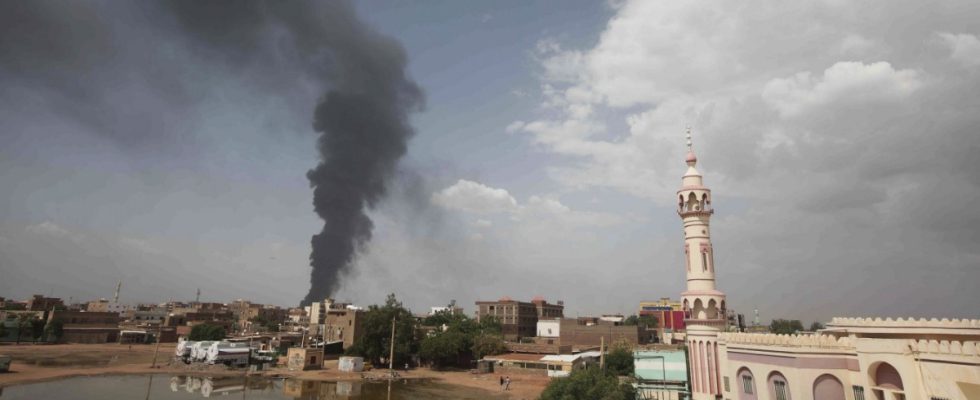And now they’re firing again with everything they’ve got. A week has passed since negotiations between the rival warring factions in Sudan broke down. The US and Saudi Arabia had tried to promote a permanent ceasefire. The initial aim of the talks was not a peace agreement at all, but a ceasefire that would have made it possible to supply civilians in the contested areas. But the past six days have shown that violence in the combat zones is increasing again. Heavy fighting was reported from Khartoum and Darfur in particular, and the plight of the Sudanese population is growing. The most recent announcement that the parties to the conflict have allegedly agreed on a very short 24-hour ceasefire for the whole of Sudan on Saturday shouldn’t change that. Hardly anyone believes in it anymore.
In the middle of the week, an army ammunition and weapons depot in the south of Khartoum was particularly hotly contested. It was set on fire and thick clouds of smoke rose into the sky. Militias of the Rapid Support Forces (RSF) under the command of Mohamed Hamdan Daglo, known as Hemeti, want to have captured a warehouse, the army under General Abdel Fatah al-Burhan claims that they were able to push back the attackers.
The UN special envoy was declared persona non grata
In addition to the military escalation, there are also serious diplomatic upheavals. The Burhan regime, which is fighting Hemeti’s troops for supremacy in the state, has declared UN special envoy Volker Perthes persona non grata. The German heads the UN mission in Sudan, and some time ago the general had called for Perthes to be withdrawn. Now the army chief is openly blaming Perthes for the escalation of the conflict. There is no evidence for this, there is much to suggest that the putsch general is looking for a scapegoat to deflect pressure from himself.
However, frustration with Perthes was also felt at times in civil political circles, and he was accused of paying too little attention to the democratic movement. So the UN special envoy sits between all stools, it’s a complicated post. The rift with al-Burhan is not making the United Nations’ work in Sudan any easier. Perthes, who was last in Ethiopia for talks, is now barred from entering Sudan.
The worst fights may be yet to come
Civilians in the capital Khartoum report the Süddeutsche Zeitungthat they feel trapped and can hardly see any way out of the violence. This also has to do with the very special combat situation, which makes Sudan experts doubt that either side could actually win this war. Because the RSF militias have spread all over the city and are often holed up in private houses, they sometimes also occupy hospitals or offices of humanitarian organizations.
It’s a perfidious tactic: They count on the enemy provoking an international outcry if such targets are attacked, because attacks on clinics are war crimes. The militias, however, also commit crimes when they deliberately barricade themselves behind civilians. “They use us as a shield,” writes a resident of the SZ. “Many houses in my neighborhood have been stormed by the RSF, or by armed gangs, they steal or just arrest people,” complains the woman from Khartoum, whose name cannot be given for security reasons. She also reports of targeted executions in her neighborhood. Such allegations cannot initially be independently verified, but they do coincide with similar stories. Some no longer even know how to bury the corpses in the streets in front of their front door.
RSF militia officers in a private apartment in Khartoum (verified by the SZ).
(Photo: Tweet post/Benedikt Heubl)
The families trapped in the capital have little chance of escaping the militia’s attacks. Secretly shot photos from apartments prove this: In a photo verified by the SZ, two RSF militia officers are lounging on the sofa in the living room, one is resting on the floor, the other is occupying the family sofa, they have rapid-fire weapons at their side. It’s almost impossible to escape terror like this.
The RSF is blamed for much of the looting in the city, some of which is documented on video, including at a store on April 18.
Several videos, such as this one, show what the homes of Sudanese families look like after the looting.
The army tries to drive the RSF out of the capital with a multi-pronged offensive, the regular forces have more heavy weapons than the RSF, they deploy tanks and bomb targets from the air. The danger of taking civilian lives with them is extremely high, and both warring factions have shown that they have little regard for the lives of civilians. However, the army has to engage in a costly house-to-house battle with the RSF if it wants to gain ground in Khartoum. The worst fights may be yet to come.
In all the misery there are sometimes rays of hope: This week, for example, helpers from the International Committee of the Red Cross (ICRC) managed to get 280 children from an orphanage and dozens of carers out of the line of fire. A small success in a sea of problems that affects the youngest in particular: According to Unicef, 13 million Sudanese children urgently need help.
But how could it get to those who need it most? As long as the RSF occupies so many houses and entire blocks of streets in Khartoum, there is a fear that they will plunder the supplies to feed their fighters.

